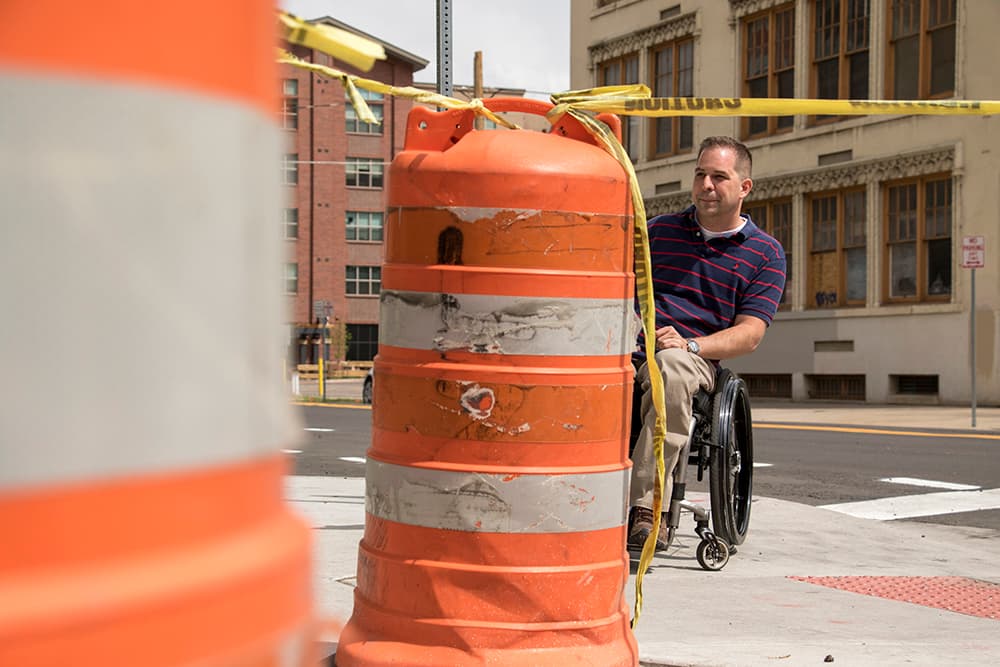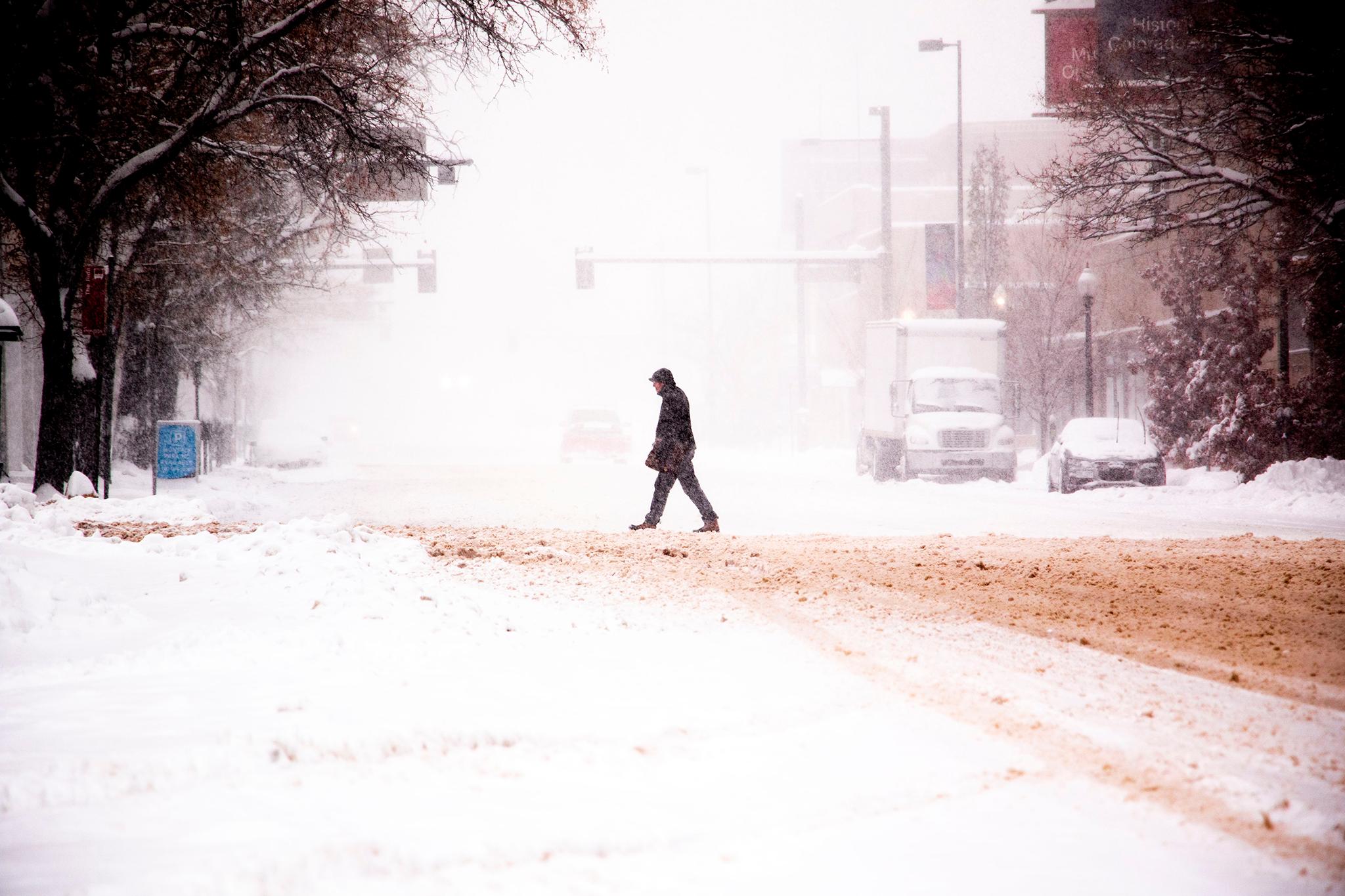Denver's sidewalks and bus stops have been smothered with snow and ice for about a week, and believe it or not, that's not the city government's problem. It's not RTD's, either.
It's your neighbor's fault. And if you don't snitch on your neighbor (or preferably, ask them to kindly shovel) nothing's getting done.
When it snows, the sidewalks and bus stops that people who walk, wheel and bus everywhere depend on become obstacle courses of barriers that can only be removed by random people -- fellow Denverites who may not realize (or care) that their inaction makes people late for work and sends others to the hospital.
Ice and snow from a week ago still muck up the public right of way because property owners -- businesses, homeowners and landlords -- are supposed to shovel the city's 3,000-plus miles of sidewalks, but have not. The city of Denver bears no responsibility, according to the city of Denver. (It's in the city code.)
And it's not just sidewalks that are someone else's problem.
Those wheelchair ramps at crosswalks required by federal law? They're also the responsibility of the adjacent property owner, according to Laura Swartz, spokeswoman for Denver Community Planning and Development. Most people don't know that.
"That's why we tell (neighborhood groups) and the business community to be good neighbors, that they're responsible for sidewalks and wheelchair ramps," said Swartz.
Curb ramps are really important for people who use wheelchairs. But they're often covered in snow, ice or slush after a storm.
"There are days when the sidewalks are fine amd the streets are fine, but getting from the streets to the sidewalks is impassable and impossible," said City Councilman Chris Hinds, who uses a motorized wheelchair.
Public alleys that cut into the sidewalk? Denver Public Works doesn't plow them, but they don't belong to business owners and homeowners, either.
Bus stops? Mostly your neighbors' responsibility, says Laurie Huff at RTD. Out of the 9,400 or so RTD bus stops systemwide, the transit agency only maintains 330 bus shelters, or about 3 percent, Huff said. Locals are supposed to shovel the path to your bus stop, too.
Who does that?
Anecdotally, we only know when people don't shovel bus stops, and we only know if and when people file complaints.
"We field them through social media, we field them through Transit Watch, through customer care calls, through emails," Huff said. But RTD could not say how many valid complaints they received with any precision.
RTD also could not say how many of their bus shelters are in Denver proper, even though the agency is responsible for maintaining them. Huff said the agency knows its responsibilities but could not pull that data.
When people neglected the civic duty that seems like the government's duty, those people got a slap on the wrist. All two of them.
By Monday at about noon, Denver inspectors had completed 93 reviews of snowy sidewalks generated by last Tuesday's snowstorm and its trailing Saturday cousin. They did not work on Thanksgiving. According to government data, inspectors still have 726 reviews to go.
So far, two property owners have received fines of $150 each. They did not shovel after an initial warning, which the city gives to every violator.
Between Oct. 1 and Nov. 20, city inspectors completed 742 inspections and only seven resulted in fines.
Denver has 14 inspectors for more than 3,000 miles of sidewalks and is looking to hire more. But even if they do, Swartz said, Denver's in over its head. There's just too much ground to cover. She recommends talking to neighbors face to face before filing a complaint with the city via its 311 service because "some people just don't know." But also "some people just don't care."
If streets getting taxpayer-sponsored plows while sidewalks and bus stops get crossed fingers seems counterintuitive to you, you're not alone.
Slippery, impassable sidewalks are not only frustrating, they're also potentially life-changing.
Councilman Hinds told Denverite he was stranded in his apartment from last Monday night until Friday after his wheelchair got stuck on a curb ramp because of the city's snowy sidewalks. When he finally left his home, it was to go to the hospital for a fever he believes stemmed from getting caught out in the cold.

This is Hinds' first snow season as a City Council member.
"I'm open to more legislation," Hinds said. "I'm not sure what it looks like because we have laws on the books and I'm a little concerned about adding more laws when we're not enforcing the ones on the books."
Perhaps unsurprisingly, last week's storm(s) resulted in an uptick in injuries from people slipping and falling, said Julie Arellano, a captain with Denver Health's paramedic division. Denver Health doesn't have stats directly connecting icy sidewalks with injuries. But anecdotally, Arellano said, slippery conditions caused more injuries than usual.
"Hand and wrist injuries from people trying to catch themselves, back injuries, head injuries -- it just kind of depends on how you fall and who you are," Arellano said.
WalkDenver, the city's top pedestrian advocacy group, commissioned a white paper in 2016 to analyze Denver's liability should someone get hurt or lose their job, for example, as a result of impassable sidewalks -- even though they technically aren't the government's problem.
It turns out that if someone sued, it might be the city government's problem after all, the paper found. Based on court cases outside of Colorado, "it apparently makes no difference whether Denver owns its sidewalks, or instead enforces maintenance and repair of landowners' sidewalks," the paper states. "It is potentially liable under the (Americans with Disabilities Act) either way."













